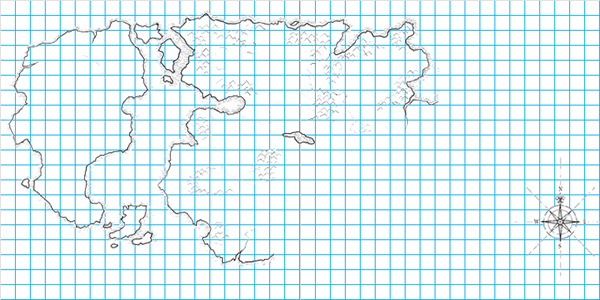We've all been there. Strolling through an adventure location in a role-playing game and the party takes a left turn and goes right off the map. This may be literal, or may mean they've just decided to take too keen an interest in some ancillary bit of flavor, leading to things you have neither developed nor stated out. You want to be a nice GameMaster and forbid yourself what is commonly called "railroading" (railroad tracks can't suddenly "turn left", after all), but you're not sure how to handle it. Let's look at your options.
Honesty
Now, this may seem like admitting failure, but we're all in this story together. If the PCs walk off the edge of the world (as prepared), you might want to tell them so. If they want to accomplish the mission, they shouldn't be too bothered that you send them in the right direction. On at least one occasion, I've gone meta and told them about this blank void on the edge of their senses, and we had a laugh about it. Of course, this only works geographically and not narratively. In-story, you could just give them a strong intuition, an NPC guide who shows up before they've gone too far, or a "vision" of things to come. But lest the players either don't trust you or become interested in the "wrong thing" again, you might want to fess up and tell them this isn't the story you prepared and ask if they'll accept a nudge from you. This is a good strategy even if you choose to follow the PCs wherever they go and improvise your socks off. Letting them know they're off your script now and ask for their indulgence as you rummage through monster stats or seem less self-assured. They'll hopefully enjoy the energy that comes with everyone at the table flying by the seat of their pants.
It All Comes Back to the Adventure
The PCs walk off the map at one end, and find themselves looped to the other side of it. All roads lead to Waterdeep, my friends. Essentially, this solution might play havoc with YOUR idea of the world's geography, but why CAN'T the wizard's tower be East rather than North? Or it's in the same place, but it's easy to get turned around in these woods/caves. Getting the PCs on track in non-travel contexts is a little more complicated, but the trick is to create a connection between the thing they are obsessing over and the "true path". That NPC they decided to track because he was acting suspiciously (when it was just your bad acting)? He's actually working for the Big Bad and heads over to their lair. That pointless search of the house actually (and quickly) provides a clue. An unbeatable threat could serve as a wall, repelling the PCs rather than luring them elsewhere, but you run the very real risk of the players trying to defeat it anyway, with resulting casualties. If it looks like a piece of the adventure, it will be treated as such, and a threat always does.
Improvise Without Stats
Whatever they're heading into, go with it, but arrange it so that there's no need to use "game mechanics" you would really need to prepare for. Either it's all social interaction, easy to adjudicate hazards, or NPCs/threats you already had in the bank. For example, you could bring out an encounter they avoided in the past, or use some of the villains/monsters that already appeared (or are meant to appear later), maybe with different names. Keep the past few sessions' notes within reach, because maybe the survivors want revenge for those deeds.
Railroading and Railroading Hard
Hahaha, I'm not actually recommending this, but it IS an option. I guess the question we could ask is why is it EVER necessary to deploy any of the above strategies rather than abandon not only the train tracks, but the whole transportation system. If you have an open-ended campaign with frequent and regular meet-ups, you can take long detours pretty easily and SHOULD. But if you DON'T meet that often, or have a group that agreed to a short run of games, getting through the scripted story is at a higher premium. You COULD say, well, that's how the cookie crumbles and the makeshift adventure that comes out of it is as worthy of play as the one you've prepared. Then again, if time is a limited resource, the GM DID just spend a lot of time on prep and quite reasonably doesn't want to abandon it entirely. We should also spare a thought for groups who play online and use programmed tools (on Foundry or Roll20) where improvised threats and locations will be harder to deploy. Don't be shy about going to full theatre of the mind in those circumstances, but it WILL be obvious that PCs just walked into a dark space and are about to be eaten by a grue.
Of course, all this presupposes that your players WANT to be on your adventure. Some players are chaos agents, or only see themselves as opponents of the GM, and could be off-roading on purpose. You either go with the flow, or if it's actually destructive, make them meet that dragon wall and let them spend the rest of the night in the other room rolling up a new character. But as long as the characters are moving, so is the story, in whatever form it ends up taking. What you really DON'T want is the PCs standing still, stuck at a puzzle or obstacle. But I suppose that's an article for another day.
Honesty
Now, this may seem like admitting failure, but we're all in this story together. If the PCs walk off the edge of the world (as prepared), you might want to tell them so. If they want to accomplish the mission, they shouldn't be too bothered that you send them in the right direction. On at least one occasion, I've gone meta and told them about this blank void on the edge of their senses, and we had a laugh about it. Of course, this only works geographically and not narratively. In-story, you could just give them a strong intuition, an NPC guide who shows up before they've gone too far, or a "vision" of things to come. But lest the players either don't trust you or become interested in the "wrong thing" again, you might want to fess up and tell them this isn't the story you prepared and ask if they'll accept a nudge from you. This is a good strategy even if you choose to follow the PCs wherever they go and improvise your socks off. Letting them know they're off your script now and ask for their indulgence as you rummage through monster stats or seem less self-assured. They'll hopefully enjoy the energy that comes with everyone at the table flying by the seat of their pants.
It All Comes Back to the Adventure
The PCs walk off the map at one end, and find themselves looped to the other side of it. All roads lead to Waterdeep, my friends. Essentially, this solution might play havoc with YOUR idea of the world's geography, but why CAN'T the wizard's tower be East rather than North? Or it's in the same place, but it's easy to get turned around in these woods/caves. Getting the PCs on track in non-travel contexts is a little more complicated, but the trick is to create a connection between the thing they are obsessing over and the "true path". That NPC they decided to track because he was acting suspiciously (when it was just your bad acting)? He's actually working for the Big Bad and heads over to their lair. That pointless search of the house actually (and quickly) provides a clue. An unbeatable threat could serve as a wall, repelling the PCs rather than luring them elsewhere, but you run the very real risk of the players trying to defeat it anyway, with resulting casualties. If it looks like a piece of the adventure, it will be treated as such, and a threat always does.
Improvise Without Stats
Whatever they're heading into, go with it, but arrange it so that there's no need to use "game mechanics" you would really need to prepare for. Either it's all social interaction, easy to adjudicate hazards, or NPCs/threats you already had in the bank. For example, you could bring out an encounter they avoided in the past, or use some of the villains/monsters that already appeared (or are meant to appear later), maybe with different names. Keep the past few sessions' notes within reach, because maybe the survivors want revenge for those deeds.
Railroading and Railroading Hard
Hahaha, I'm not actually recommending this, but it IS an option. I guess the question we could ask is why is it EVER necessary to deploy any of the above strategies rather than abandon not only the train tracks, but the whole transportation system. If you have an open-ended campaign with frequent and regular meet-ups, you can take long detours pretty easily and SHOULD. But if you DON'T meet that often, or have a group that agreed to a short run of games, getting through the scripted story is at a higher premium. You COULD say, well, that's how the cookie crumbles and the makeshift adventure that comes out of it is as worthy of play as the one you've prepared. Then again, if time is a limited resource, the GM DID just spend a lot of time on prep and quite reasonably doesn't want to abandon it entirely. We should also spare a thought for groups who play online and use programmed tools (on Foundry or Roll20) where improvised threats and locations will be harder to deploy. Don't be shy about going to full theatre of the mind in those circumstances, but it WILL be obvious that PCs just walked into a dark space and are about to be eaten by a grue.
Of course, all this presupposes that your players WANT to be on your adventure. Some players are chaos agents, or only see themselves as opponents of the GM, and could be off-roading on purpose. You either go with the flow, or if it's actually destructive, make them meet that dragon wall and let them spend the rest of the night in the other room rolling up a new character. But as long as the characters are moving, so is the story, in whatever form it ends up taking. What you really DON'T want is the PCs standing still, stuck at a puzzle or obstacle. But I suppose that's an article for another day.



Comments
With my preference for running mystery games, garrulous, indiscrete locals loitering about are a valued asset for helping to correct errant assumptions. Some GMs consider this cheating, somehow. I'd say an adventure is not a munificent puzzle box, but primarily a social experience, a little nudge from time-to-time letting everyone feel duly included and clever.
Of course, if you are utilizing a fantasy map, you could summarily inform the players that their characters just died having walked off the edge of the known world. ;)